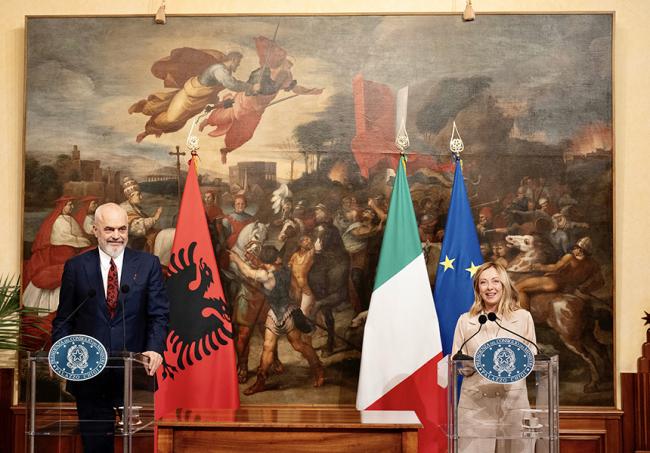Albania has agreed to house thousands of asylum-seeking migrants while Rome fast-tracks up to 36,000 applications a year for asylum in Italy. The aim is to allow the two countries to jointly process asylum applications of migrants arriving by sea.
Italy has committed to pay for the construction of two centres with a capacity of 3,000 migrants, one of which is in the Albanian port of Shengjin, about 75 kilometres south of the capital Tirana. Albania would provide external security for the centres, which would come under Italian jurisdiction.
Migrants would be brought to Albania aboard Italian ships, with Italy agreeing to remove any whose applications for international protection are rejected.
The deal, which must be approved by Albania’s parliament, has already drawn fire from Italy’s opposition, from rights organizations and from others, and could even impact Albania’s EU membership aspirations. Experts note that the terms of the pact fail to spell out the exact migration procedures to be followed inside the centres.
Meanwhile, the European Commission awaits further details.
Some in Albania see the move as a thank you gesture for the welcome Rome extended to the thousands of Albanians who ended up in Italy after the fall of communism more than three decades ago.
Albania’s Prime Minister Edi Rama announced the five-year deal in Rome on Monday. Standing alongside his Italian counterpart Giorgia Meloni, Rama expressed gratitude on behalf of the Albanians who had found refuge in Italy.
Not all Albanians are keen about the proposal. Many fear the negative consequences opening such centres could have on a thriving tourism industry, that so far this year has attracted more than 9 million tourists to visit Albania’s pristine coastline. A demonstration against the agreement has been announced for November 11th.
Human rights activist Arilda Lleshi taking to what once was Twitter decried the agreement as anti-constitutional – a decision arrived at “without consultation with institutions and citizens”, she said. That Albanian land had been placed under Italian jurisdiction, violated the right of refugees to asylum in the countries where they apply and their right to decent conditions and freedom, she argued. There was also the potential risk of incidents in the camp and in the community.
The choice of Shengjin port made no sense, she added, since, countries the refugees come from. Moreover, making it a “refugee camp”, threatened its status as “a tourist destination”.
Those whose asylum applications are rejected and who are to be deported are to be sent to Gjader, a former military airport located 20 kilometres north of Shengjin.
The proposal does not state how they will be repatriated, nor does it say where migrants will be screened for transfer to Albania, whether at sea or on Italian soil.
Albania has a recent history of welcoming refugees fleeing conflict and poverty. In 2020, it was temporary host to around 4,000 Afghans, a small number of whom remain in Albania waiting to move on to the U. S. or other Western countries.

